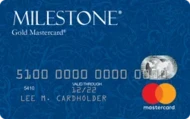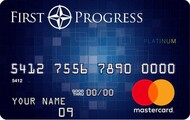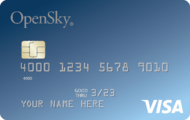Milestone Gold Mastercard
The Milestone Gold Mastercard from The Bank of Missouri is an unsecured credit card designed to help you build or rebuild your credit history. Depending on your credit situation and how you use the card, however, it could get expensive. View More >First Progress Platinum Select Mastercard® Secured Credit Card
First Progress offers three secured credit cards for people who are new to credit or rebuilding their credit. These cards have the same application requirements and similar features, but offer a choice between a lower annual fee or lower interest rate. The Platinum Select Mastercard® Secured Credit Card is the middle option. View More >OpenSky Secured Visa Credit Card
One of the biggest barriers to building credit is not having a bank account. If you don’t have either, the OpenSky Secured Visa Credit Card from Capital Bank, N.A. can help you, and for a reasonable price. You won’t need any credit at all to get a card, and you won’t need a bank account either, although you may need to find some creative ways to pay the security deposit and your bill. View More >Discover it® Secured
Discover it® Secured is 2019’s best secured credit card because it has a $0 annual fee and rewards cardholders with 1% to 2% cashback on purchases. The Discover it Secured card also doubles the rewards cardholders earn the first year. Very few secured cards even offer rewards. View More >Citi® Secured Mastercard®
While offering no rewards and limited benefits, the Citi Secured Mastercard presents a good way to build credit whether you’re new or working your way back from having bad credit. It requires a security deposit to fund your credit limit, but Citi may eventually return your deposit if you show responsible credit habits. View More >Capital One® Secured Mastercard®
If you need to build or repair your credit, the Capital One Secured Mastercard provides a simple, inexpensive opportunity to do so. You’ll need to provide an initial security deposit to establish your line of credit, up to a maximum of $1,000, but you’ll be able to increase it in time. View More >Related Suggestions
Food (Restaurants and Groceries)
The Bank of America® Cash Rewards Credit Card (Review) is one of the most flexible cash back cards around, with a 3% bonus category you can change every month. Dining is one of your choices, along with quite a few other useful options, and you’ll always get grocery stores for one of your smaller categories.
No Annual Fee Credit Cards For Flat-Rate Rewards
Paying an annual fee on a credit card can be worth it if it gets you substantially higher rewards. But in many cases, credit cards that don’t charge annual fees offer better long-term value than those that do. No-annual-fee credit cards make it easy to come out ahead, regardless of your spending. Plus, you’ll be able to keep your card open for a long time at no cost, increasing the average age of your accounts, which has a positive effect on your credit score.
No Annual Fee Credit Cards For Long 0% Balance Transfer APR
If you need a card with a long 0% intro APR for purchases, it will be hard to beat the U.S. Bank Visa® Platinum Card.
No Annual Fee Credit Cards For Long 0% Purchase APR
If you need a card with a long 0% intro APR for purchases, it will be hard to beat thses cards.
No Annual Fee Credit Cards For Rotating Bonus Categories
The Discover it® Cash Back (Review) is our top pick for rotating cash back categories thanks to its unique Cashback Match. You’ll earn 5% back in categories that change every three months, up to $1,500 spent per quarter (activation required).






